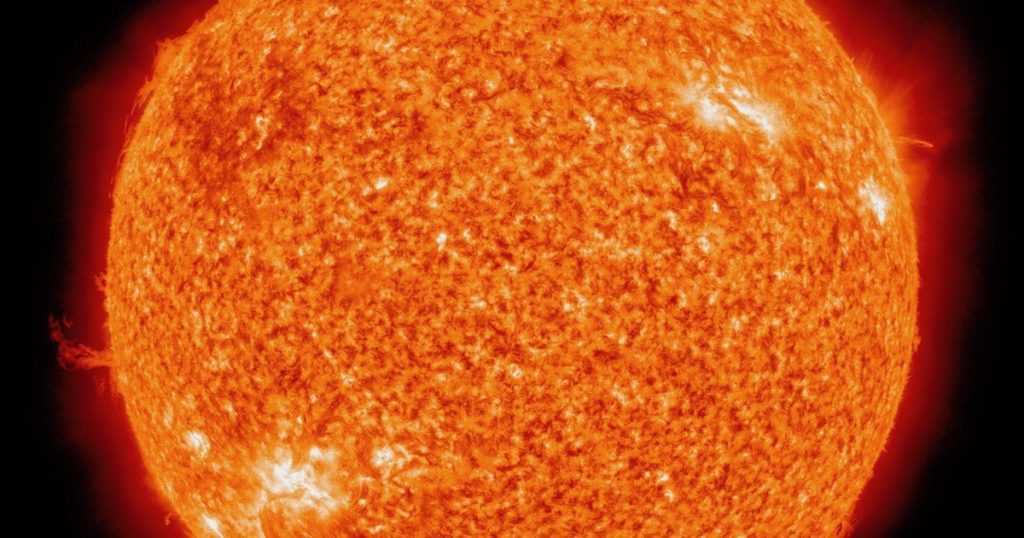 Intelligent Design
Intelligent Design
 Physics, Earth & Space
Physics, Earth & Space
Solar Activity Reveals a Different Kind of “Privilege”

Did you experience anything unusual a couple of Wednesdays back? Perhaps a feeling of impending doom, or even just a slight change in mood?
No? Well, then perhaps you are more privileged than you think.
On Saturday, January 29, the sun — you know, that yellow dwarf star around which we orbit at over 100,000 kilometers per hour — decided to throw a violent tantrum resulting in an eruption of high energy particles and magnetism. The outburst reached earth’s atmosphere on Wednesday, February 2. This coronal mass ejection, and the resulting geomagnetic storm in our atmosphere, likely had indiscernible — if any — impact on your less-than-momentous hump day. Unless I missed something, it didn’t even merit a mention in the weather forecast.
A “Milquetoast Outburst”
According to Hugh Lewis, a space debris expert at the University of Southampton cited in a New York Times article, this solar incident was actually mild compared to what we can expect approaching the year 2025. “As the sun gets more active, it releases an increasing amount of extreme ultraviolet, which gets absorbed into our atmosphere,” Lewis explains. “The expectation is that the atmospheric density is going to increase by one or two orders of magnitude. That’s a way bigger change compared to what we’ve just seen with this particular event.” Or, as Robin George Andrews writes for the Times, this was a “milquetoast outburst” compared to “a more potent solar scream [that] has the potential to inflict greater harm.”
So…does this mean that the world is coming to an end? Should you drop out of school or quit your job, and enjoy your last few toasty years on this doomed planet?
Not so fast. As Andrews points out, we are simply ramping up to the peak of an 11-year-long cycle in which the sun undulates between hyperactive and quiescent states. This solar cycle, coinciding with the reversal of the sun’s magnetic field, has already reached a violent peak one or more times in your lifetime and, just like Wednesday’s incident, that has had negligible — if any — impact on your daily life.
Perhaps, like me, you’ve taken this fact for granted — that a fierce coronal mass ejection from the sun has little effect on life at the surface of the planet. In fact, it is one of many privileges that humanity accepts as a given, regardless of our ethnicity, gender, or socioeconomic standing: the privilege of living on a planet that is astonishingly protected in the midst of an otherwise inhospitable cosmos.
Blissfully Unaware of Bombardment
Like you, I was blissfully unaware that our atmosphere was being bombarded, and only stumbled upon the fact a few days ago in the Times. The article, “Solar Storm Destroys 40 New SpaceX Satellites in Orbit,” focuses on the impact of the solar ejection on the latest satellites launched into space as part of Elon Musk’s high speed Internet project. The reporter concludes that “the incident highlights the hazards faced by numerous companies planning to put tens of thousands of small satellites in orbit to provide Internet service from space.”
True, the fact that 40 of the 49 new satellites launched into the lower atmosphere on February 3 could be knocked out by a routine solar outburst is a reminder of the incredible challenges facing aerospace technology. That’s a $100 million loss in hardware and launch costs incurred by SpaceX, as estimated by Dr. Lewis in the article.
But there’s far more at stake. Without the combined protective effect of our unique atmosphere and geomagnetic field — a relatively rare phenomenon in the observable universe — even a “milquetoast outburst” from the sun would be sufficient to destroy all life on earth.
Yet this brief article was the only mention of the occurrence that I could find either in the New York Times or a handful of other major news sites. It goes to show how most of us take our privileged planet for granted. Perhaps an occasional demonstration of our cosmic entitlements could also remind us of the privileges that we all share as a human species — privileges that are considerably greater than those that threaten to divide us.
